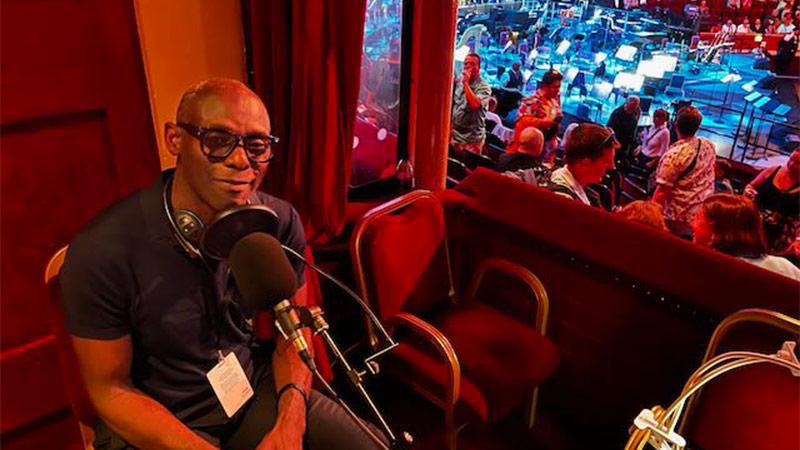Dr Mykaell Riley, Senior Lecturer, Director for The Black Music Research Unit (BMRU) and Principal Investigator for Bass Culture Research at the University of Westminster, recently spoke to the BBC Proms at the World Service on the sound of disco, drawing importance to its culture and the impact it has across the world.

The radio interview took place at the Royal Albert Hall in central London, as part of the Proms 2024. Titled Prom 2: Everybody Dance! The Sound of Disco, the concert was held to bring together music, dance and disco hits from the 1970-80s reimagined for an orchestra and singers, to celebrate a pivotal movement in late 20th-century club culture.
Mykaell Riley talked about how disco played an important part in his teenage years regarding alternative music to reggae, a style of music that he has profound knowledge of. His career started as a founder member of Grammy Award-winning roots reggae band Steel Pulse between 1977-78 on percussions and backing vocals. He also formed The Reggae Philharmonic Orchestra, Britain's first Black pop orchestra.
He said that the first thing that makes disco music different from other genres is the standard 4/4 drumbeat, also known as Four-on-the-Floor, stating that “it made it easier for people to access, especially for those that were looking for an easy way into dancing, a really important aspect of disco.” Disco was all-encompassing and included everyone, but at the forefront the gay community, according to Riley. It additionally brought together musical styles, and instrumentation such as the strings in classical music, the arrangements in jazz and hints of pop, but most importantly, disco was about an escape into an alternative world through music. Lastly, it transformed club culture. “It made club owners remove the chairs to create more space for people to stand up and dance,” Riley said.
Mykaell Riley addressed how definitive of the period of music that disco was. He said: “Disco was also political. If you’re involved in a cultural expression that successfully challenges the state, you become important to that age group or cultural expression. Disco was this. It provided an opportunity and a platform for the gay community to come through, but it was also about young people. America was going through a depression, so through the music, people found a way to escape into an alternative club scene that was open and welcoming to everyone.”
He concluded the interview by saying that the period between 1978-79 was ground zero for disco, where this music takes centre stage. Prior to that, its growth had been recognised, but at this point in time, it was now globally known with its own musical narrative and club culture. Dr Riley said: “As a genre it had the music industry behind it. It was on the radio and it had found its way into videos and eventually films.”
Dr Mykaell Riley’s research centers around mapping Black British music. Bass Culture Research was created in reaction to the disengagement in and lack of knowledge regarding the history of Jamaican and Jamaican-influenced music in Britain during the previous six decades. He has also worked as an external examiner in seven universities across the UK and recently collaborated with The British Library for the first annual Black British Music Symposium.
Listen to the full interview on BBC Sounds from 00:43.


